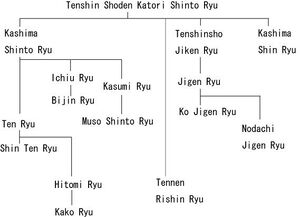Ten Ryu
- Japanese:天流 or 天道流(Tendo Ryu)
- Type: Kenjutsu, Naginatajutsu, Sojutsu, Kusarigamajutsu[1], Shurikenjutsu
- Founder: Saito Denkibo Katsuhide 斎藤伝鬼坊 (斉藤伝鬼房勝秀(忠秀)[1])
- Era: 1500s
Saito Denkibo learned Shinto Ryu (新当流) from Tsukahara Bokuden and founded Ten Ryu, so tradition states, after a dream he had at Tsurugaoka Hachimangu in Kamakura. Bugei Shoden (武芸小伝) states this was on the 21st day of the 11th month of the 21st year of Tensho (1593), when he was 31 years old.[2] In Nihon Bujutsu Shoryushu (日本武術諸流集) it states that this was actually the 19th day of the 10th month of the 9th year of Eiroku (1566).[1] Ten Ryu Shodenn Shinto Ryu Heiho Denmyaku (天流正伝新当流兵法伝脈) states, however, that he had been a student under Tsukahara Tosanokami Yasumoto's son Shin'uemon Yasuhide, and founded Ten Ryu because he had been hamon'd (cut off) from that line. It goes on to say that he died of an illness at the age of 38.[1]
The kusarigama used in Ten Ryu has a 1-shaku 2-sun handle, a 4-sun 5-bu long blade, and the chain is measured to the two hands of each individual.[1]
He had many Daimyo pupils.
The Naginatajutsu of this Ryu spreads most in the present. It was one of the foundations of atarashii naginata.[3]
Lineage
- Saito Denkibo Katsuhide (Founder)
- Saito Hogen
- Saito Ushinosuke
- Hinatsu Shigeyoshi
- Hinatsu Yanosuke Yoshitada
- Shimogawara Shinnai Yoshinaga
- Okudaira Jingobe'e Hirotake[4]
- Shimogawara Shinnai Kazuyoshi (Kazukiyo?)[5]
- Shimogawara Shinnai Kazuyuki(?)[6]
- Shimogawara Benzo Kazuno(?)[7]
- Shimogawara Yuroku(?) Kazuhiro[8]
- Shimogawara Sen'ichiko(?)[9]
- Mitamura Akinori
- Mitamura Chiyo (Tendo Ryu Naginata)[10]
- Mitamura Takeko [11]
Footnotes
- ↑ 1.0 1.1 1.2 1.3 1.4 Bugei Ryuha Daijiten
- ↑ Bugei Ryuha Daijiten. This is contentious, since the same source also mentions that Hitachi Kokushi (常陸国志) puts his death, at the age of 38, in the 15th year of Tensho (1587).
- ↑ Bennett, Alexander (2005), Naginata:The Definitive Guide, Kendo World Publications, Auckland, New Zealand, pp 43-57.
- ↑ 奥平甚五兵衛広武
- ↑ 下河原新内一恭
- ↑ 下河原新内一致
- ↑ 下河原弁蔵一納
- ↑ 下河原唯六一弘
- ↑ 下河原洗一霍
- ↑ Bugei Ryuha Daijiten has a comprehensive lineage, but does not indicate 'soke' lineage, and includes several lines).
- ↑ Bennett 2005
References
- Nihon Densho Bugei Ryuha Dokuhon(日本伝承武芸流派読本) Shinjinbutsu Orai sha 1994.
- Watatani, Kiyoshi and Yamada, Tadashi (2003), Bugei Ryuha Daijiten (武芸流派大辞典), Tokyo Copy, Tokyo, Japan.
